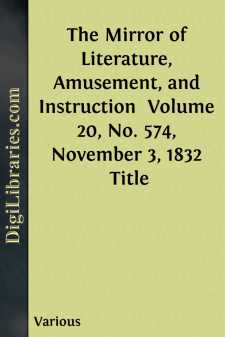Categories
- Antiques & Collectibles 13
- Architecture 36
- Art 48
- Bibles 22
- Biography & Autobiography 815
- Body, Mind & Spirit 144
- Business & Economics 28
- Children's Books 18
- Children's Fiction 14
- Computers 4
- Cooking 94
- Crafts & Hobbies 4
- Drama 346
- Education 58
- Family & Relationships 59
- Fiction 11835
- Games 19
- Gardening 17
- Health & Fitness 34
- History 1378
- House & Home 1
- Humor 147
- Juvenile Fiction 1873
- Juvenile Nonfiction 202
- Language Arts & Disciplines 89
- Law 16
- Literary Collections 686
- Literary Criticism 179
- Mathematics 13
- Medical 41
- Music 40
- Nature 180
- Non-Classifiable 1768
- Performing Arts 7
- Periodicals 1453
- Philosophy 65
- Photography 2
- Poetry 896
- Political Science 203
- Psychology 44
- Reference 154
- Religion 515
- Science 126
- Self-Help 85
- Social Science 83
- Sports & Recreation 34
- Study Aids 3
- Technology & Engineering 60
- Transportation 23
- Travel 463
- True Crime 29
Our website is made possible by displaying online advertisements to our visitors.
Please consider supporting us by disabling your ad blocker.
Scientific American, Volume XLIII., No. 25, December 18, 1880 A Weekly Journal of Practical Information, Art, Science, Mechanics, Chemistry, and Manufactures.
by: Various
Categories:
Description:
Excerpt
ONE MORE NUMBER.
The next issue will close another volume of this paper, and with it several thousand subscriptions will expire.
It being an inflexible rule of the publishers to stop sending the paper when the time is up for which subscriptions are prepaid, present subscribers will oblige us by remitting for a renewal without delay, and if they can induce one or more persons to join them in subscribing for the paper, they will largely increase our obligation.
By heeding the above request to renew immediately, it will save the removal of thousands of names from our subscription books, and insure a continuance of the paper without interruption.
The publishers beg to suggest to manufacturers and employers in other branches of industry that in renewing their own subscriptions they add the names of their foremen and other faithful employes. The cost is small, and they are not the only ones that will derive benefit. The benefit to the employe will surely reflect back to the advantage of the employer. The hints, receipts, and advice imparted through our correspondence column will be found of especial value to every artisan and mechanic, as well as to students and scientists.
For terms, see prospectus.
It is estimated that the total annual losses of insured property by fire, throughout the world, average nearly two hundred million dollars. Add to this the annual destruction of uninsured property, and we should probably have a total amounting to quite double these figures. How great the loss, how severe the tax upon the productive industry of mankind, this enormous yearly destruction amounts to, will come home to the minds of most readers more directly if we call attention to the fact that it just about equals the value of our total wheat crop during a year of good yield. And it is a direct tax upon productive industry everywhere, because, although here and there a nominal loser, fully insured, has only made what is sometimes called "a good sale" to the companies holding his risk, this is only a way of apportioning the loss whereby the community at large become the sufferers. Thus it is that we find all ably-managed insurance companies earnestly endeavoring to make it plain to the public how fires should be guarded against, or most effectually localized and controlled when once started.
During the fall, or from "lighting up" time till about New Year's day, more fires occur ordinarily than in any other portion of the year. This fact points to some of the most general causes of conflagrations—as in the lighting and heating of houses, factories, etc., where this had not been necessary during the summer months. It is also found that after the first of the year the number of fires is greatly diminished, the lighting and heating arrangements having been subjected to a period of trial during which their most obvious defects would be remedied. While it may readily be conceded that the utmost care of the owner of property could not totally prevent great average losses from fire—for the greater the holdings the more must the proprietor trust to the oversight of others—it is evident that the above facts indicate the necessity of more strenuous precautions at this season....












